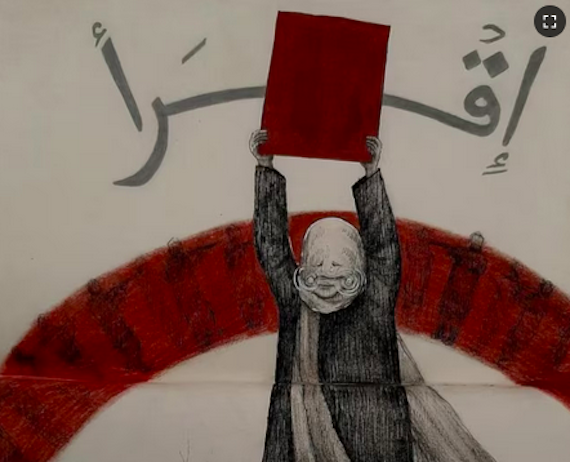“Unfortunately, like other Afghan girls, I now stay at home,” she says. “I portray the pain and suffering of Afghan girls, which I don’t like because I want to portray the joys of Afghan girls and the beauty of my homeland.”
Ahmadzai, who was in her third semester of university at the time of the forced school closures, wants to depict the aspirations of Afghan women hidden behind the burqa.
Mina Mamik’s family is from Nangarhar Province. Her family moved to the Netherlands when she was a child.
“Our motherland went through terrible times, but now we are in one of the darkest stages of our history, as we are the only country in the world where girls can’t go to school and educate themselves and are being restricted from many more things,” she says.
Mamik painted Hope to express her desire that Afghanistan will rise from the ashes again one day.
“Women are a source of light, courage, and motivation in their own homes but also on a greater scale. They are the core pillars of every society, and so are they the pillars of our society,” she adds.
Lema Sarwan is from Ghazni Province. She has been living in Prague for more than a decade.
“This painting symbolizes the oppression of women in Afghanistan. The school girl is all ready to attend school but cannot because of the system put in place by the Taliban,” she says.
Sara Rahmani was born and raised in Afghanistan. She moved to the United States five years ago and is currently studying civil engineering. Her untitled painting above depicts the three stages of life for refugees, especially girls, who fled to a foreign country after the Taliban returned to power.
“The first phase is of Kabul’s beauty, happiness, and freedom, while girls went to school like boys,” she says.
The second stage follows the chaos during Taliban rule.
“The sad situation of closing schools for girls, the struggle of women and girls to regain their rights, and the attempts of people to escape Afghanistan, where the Taliban have created an environment like prison,” she says.
Rahmani ends her piece with “the stage of regret and nostalgia after migration.”
Sara Barack is a native of the western Herat region. She won a scholarship to study art and film in Turkey after finishing high school. She is renowned for being Afghanistan’s first female animator.
She writes:
They made me unseen, shrouded and a nonbeing.
A shadow, no existence, made silent,
Denied of freedom, restricted to my cage.
Tell me how to handle my anger and my passion?
Tell me how can I be alive in this world?
Rokhsar Rahimi, 18, was born and raised in Kabul. She has held a number of art shows while a student in Kabul. She was in her final year of high school when the Taliban barred her and other young woman from finishing her studies.
Fearing persecution, Rahimi and her family fled Afghanistan. Her painting, Breaking The Chains, captures the plight of young women.
“As you can see in the picture, the chain tied to the girls’ feet is breaking and they are moving toward the light for their future. The painting symbolizes the current situation of Afghan girls who are banned from education. But they do not accept this state, and millions of Afghan women and girls are fighting for their rights to education and work,” Rahimi says.
“Today, even though Afghan women are deprived of the right to education, they still study in secret and do not let others decide their fate.”
Atena Sultani is from Herat Province and is a graduate of the Faculty of Fine Arts at Herat University.
“In Afghanistan, women were and are victims of the war. These days, when Afghan girls are going through a ‘cold war’ waged upon them, I want to ask to please support them and speak out wherever you are in the world.”
Sultani is unable to continue her education elsewhere due to the Taliban’s refusal to provide female graduates with their diplomas.
Maria Hosein-Habibi was born in Kabul and raised in Germany. She has been drawing and painting since childhood. She obtained a master’s degree and since 2020 has been lecturing at a university, as well as teaching art and English at a secondary school.
“Through art, I try to highlight issues regarding Afghanistan and introduce Afghan culture,” she says. “Other topics I refer to within my artistic work are questions of identity, social pressure and individual emotions.”
Her painting above is a metaphor for the current Taliban policies and her aspirations.
“It shows a girl with a chador, but underneath, she is reading a book that shines brightly,” she says “It shows that education will grant a bright future. The book is called The Future Of Afghanistan.”














 © 2024 All Rights Reserved
© 2024 All Rights Reserved